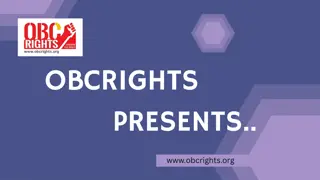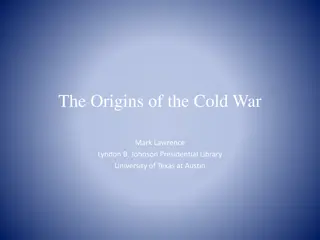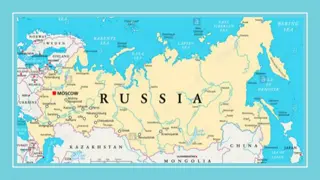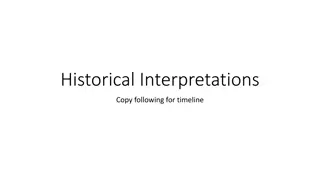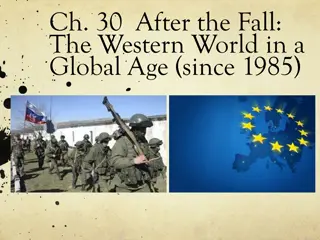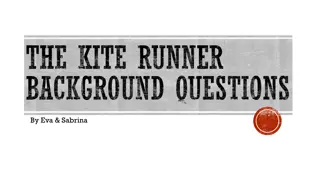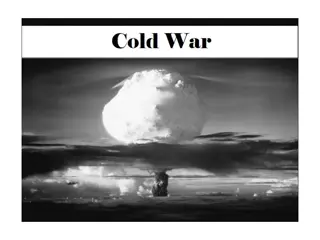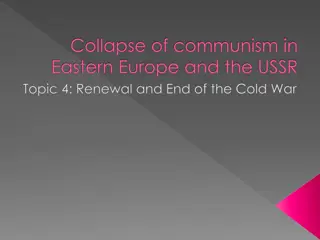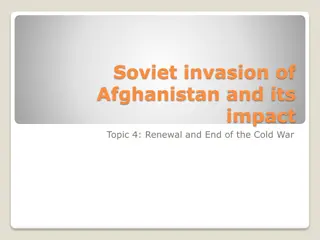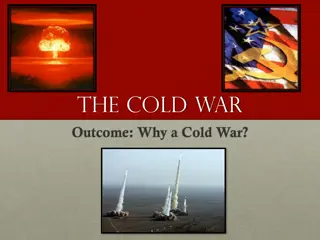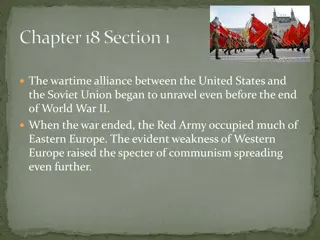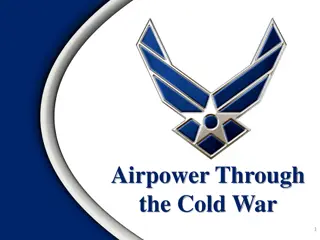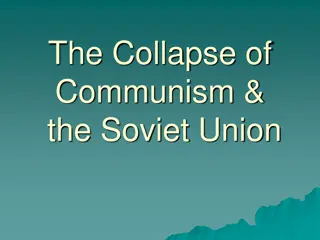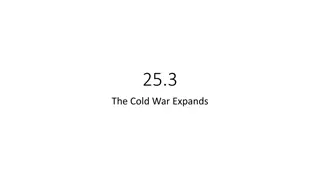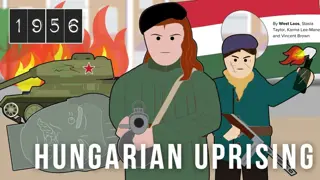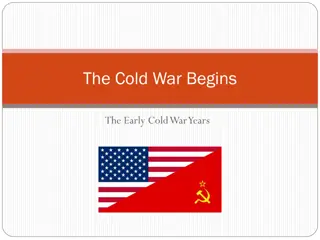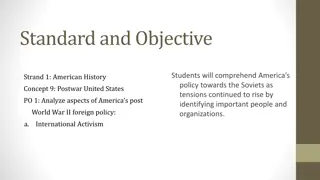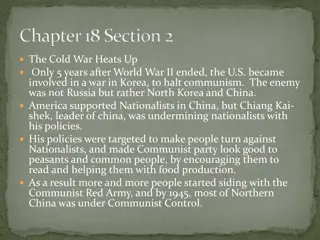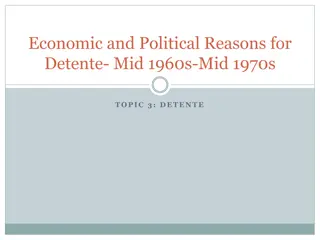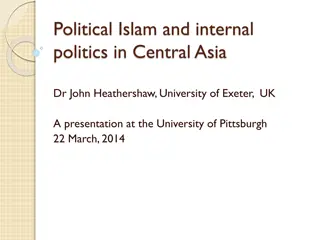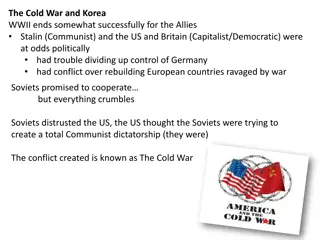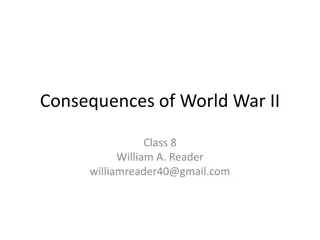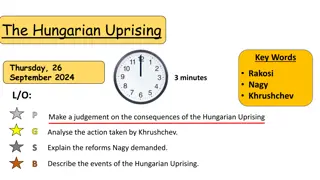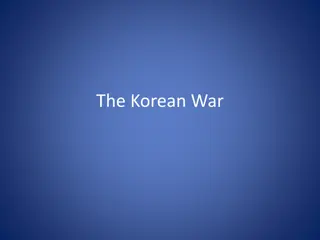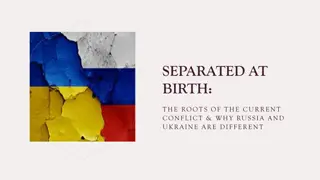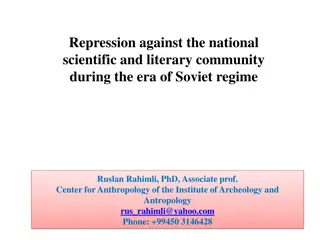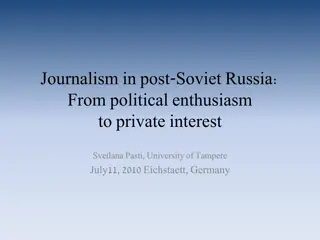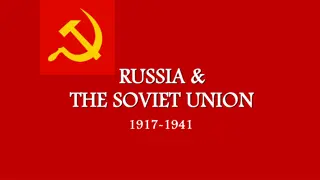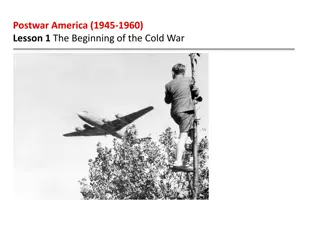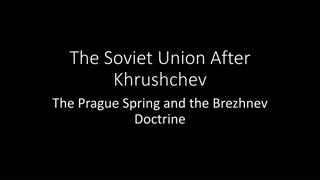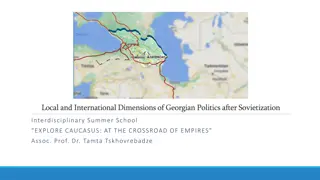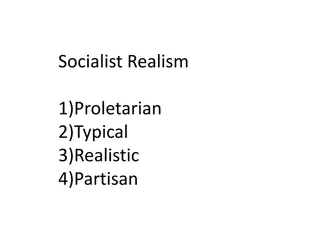Exploring Global Literary Radicalisms in the Soviet Era
The passage delves into the life of Margulies, detailing his meticulous routine and contemplation of time in the Soviet context. It reflects on themes of industrial progress, historical backwardness, and the intertwining of time and life. Additionally, it references Stalin's vision for economic adva
2 views • 18 slides
[PDF⚡READ❤ONLINE] Energiya-Buran: The Soviet Space Shuttle (Springer Praxis Book
\"COPY LINK HERE ; https:\/\/getpdf.readbooks.link\/0387698485\n\nDOWNLOAD\/PDF Energiya-Buran: The Soviet Space Shuttle (Springer Praxis Books) | Energiya-Buran: The Soviet Space Shuttle (Springer Praxis Books)\n\"\n
1 views • 6 slides
Insights into Eastern Europe: History, Economy, and Culture
Eastern Europe, known for its rich history as a cultural crossroads, has experienced significant changes over the years. From being under Soviet control to gaining independence and transitioning to market economies, the region has seen diverse developments. The economy shifted from government-contro
4 views • 12 slides
Comprehensive Approach to Pre/Post-Operative Emergency Management
The provided content covers a case of a patient post right hemicolectomy with abdominal pain. Initial assessment and management plan are discussed, emphasizing the importance of targeted post-operative assessment and recognizing serious post-operative pain causes. Other potential complications and e
2 views • 22 slides
Researching at GARF: Accessing Soviet and Post-Soviet Documents
Explore the State Archive of the Russian Federation (GARF) for Soviet and post-Soviet documents accessible to both Russian and international researchers. Learn how to obtain a researcher pass, request materials, utilize electronic finding aids, and search for specific terms and files remotely. Disco
1 views • 16 slides
Post Matric Scholarship for OBC Students – Puducherry
How to get Post Matric Scholarship for Obc in Puducherry\n\nThe Post Matric Scholarship for OBC Students in Puducherry for the academic year, offered by the Ministry of Social Justice & Empowerment, Government of India, is an opportunity for students in the OBC category to pursue post-matric educati
1 views • 5 slides
Importance of Post-16 Planning and Using Unifrog
Understanding the significance of post-16 planning for future success and utilizing Unifrog tools to create a pathway for achieving goals. Access Unifrog to record Post-16 intentions and gain guidance on career planning. Engage with educational resources to develop a strategic plan for post-16 aspir
0 views • 12 slides
The Origins of the Cold War and U.S.-Soviet Antagonism
Amid post-World War II developments and contrasting ideologies, the Cold War emerged, marked by Yalta and Potsdam Conferences, the Truman Doctrine, the Marshall Plan, the Berlin Blockade, NATO's formation, and more. Various perspectives exist on the roots of U.S.-Soviet tensions, with the Soviet vis
1 views • 16 slides
The Ruthless Reign of Joseph Stalin in the Soviet Union
Joseph Stalin rose to power in the USSR after Lenin's death, implementing totalitarian control through purges, collectivization, and propaganda. His regime led to millions of deaths, forced labor camps, and a cult of personality, shaping Soviet society through fear and oppression.
0 views • 8 slides
Cold War Historical Interpretations Timeline
Explore different historical interpretations of the Cold War through three main perspectives: Traditional/Orthodox, Revisionist, and Post-Revisionist/Contemporary/Post-1991. The Traditional/Orthodox view blames Stalin for the breakdown of relations, the Revisionist view points to mutual provocations
1 views • 9 slides
The Fall of the Soviet Union: Gorbachev's Reforms and Global Impact
In the late 20th century, the collapse of the Soviet Union under Gorbachev's leadership ushered in a new era of economic, political, and social change. Gorbachev's policies of glasnost and perestroika opened up Soviet society, leading to nationalist movements and ultimately the dissolution of the US
0 views • 12 slides
Impact of Taliban and Soviet Occupation on Afghanistan
Life under the Taliban regime in Afghanistan was marked by strict rules and harsh restrictions, especially for women. The people faced curfews, limitations on education and work, and severe punishments for non-compliance. The Soviet occupation brought its own set of challenges, with significant chan
0 views • 5 slides
The Cold War: Rivalry and Tension Between Superpowers
The Cold War, lasting from post-World War II to the 1980s, was defined by political tension and rivalry between the United States and the Soviet Union. Despite never engaging in direct military combat, both sides competed through political maneuvering and propaganda, impacting global conflicts and t
0 views • 11 slides
Fall of Communism in Eastern Europe and the USSR: Renewal and End of the Cold War
The dissolution of the Soviet Union in December 1991 marked the end of an era, with the Revolution of 1989 seeing Soviet states revolt, culminating in the fall of the Berlin Wall symbolizing the collapse of Communism. Gorbachev's resignation on December 25th, 1991, swiftly followed by the dissolutio
0 views • 8 slides
Impact of Soviet Invasion of Afghanistan on the End of the Cold War
The Soviet invasion of Afghanistan in 1979 triggered a significant shift in international relations. The US responded with protests, sanctions, and support for Afghan rebels, leading to the collapse of detente. The conflict eventually led to the withdrawal of Soviet troops in 1990, contributing to t
0 views • 5 slides
Understanding the Causes and Impact of the Cold War
The Cold War was fueled by post-WWII tensions between the United States and the Soviet Union, driven by conflicting ideologies and geopolitical ambitions. The spread of communism, arms race, space race, and even sports rivalry characterized this conflict, lasting about 45 years. The competition for
2 views • 12 slides
The Unraveling of the Wartime Alliance and the Beginnings of the Cold War
The chapter delves into the breakdown of the wartime alliance between the United States and the Soviet Union post-World War II. Tensions rose as the Red Army occupied Eastern Europe and communism seemed to spread. The Marshall Plan's role in restoring Western Europe, coupled with events like the Cze
1 views • 15 slides
Advancement of Social Work in Post-Soviet Countries Conference
The 4th Conference on Advancement of Social Work in Post-Soviet Countries discussed future strategies for social work education, emphasizing the importance of developing knowledge domains, educating social workers, providing services, research, and policy-making. It highlighted the interdisciplinary
0 views • 19 slides
Airpower Through the Cold War: A Historical Overview
This historical overview delves into the significance of airpower during the Cold War era, exploring key events such as the National Security Act of 1947, the Berlin Airlift, and the Cuban Missile Crisis. It outlines the establishment of the United States Air Force, the circumstances post-WWII, the
0 views • 26 slides
The Collapse of Communism and the Soviet Union: A Historical Overview
The collapse of communism in the Soviet Union was influenced by factors such as a home-grown insurgency, the rise of the Polish trade union Solidarity, and the reforms initiated by Mikhail Gorbachev. Solidarity, led by Lech Walesa, played a significant role, supported by the Catholic Church. Gorbach
0 views • 15 slides
The Cold War Expansion and Nuclear Arms Race
The Cold War intensified as the Soviet Union detonated an atomic bomb, leading to heightened tensions. Communist advancements, including the takeover of communist China, shocked the world. Nuclear arsenals expanded with the development of the hydrogen bomb, sparking concerns of an arms race. Eisenho
0 views • 17 slides
Hungarian Revolution of 1956: Impact on the Cold War
The Hungarian Revolution of 1956 marked a significant episode in the Cold War era, challenging Soviet dominance and leading to widespread consequences. The uprising, led by Imre Nagy, faced brutal Soviet suppression, resulting in thousands of casualties and reinforcing Soviet control over Hungary. T
0 views • 10 slides
Key World War II Conferences and Agreements
Explore the significant World War II conferences such as the Atlantic Charter, Casablanca, Tehran, Yalta, and Potsdam. Understand the key agreements reached between the US, Britain, and the Soviet Union, shaping the post-war landscape. Delve into the goals, declarations, and decisions that impacted
0 views • 7 slides
The Cold War Begins: Early Years and Containment Policies
The early years of the Cold War marked by conflicts between the United States and the Soviet Union, shaped by policies like the Long Telegram, Containment, Truman Doctrine, and the Marshall Plan. Tensions escalated with events such as the Crisis in Iran and the Berlin Crisis as the world grappled wi
0 views • 21 slides
America's Policy Towards Soviets in the Early Cold War Years
The early Cold War period saw heightened tensions between America and the Soviets, with key events like the Long Telegram and Crisis in Iran shaping America's containment policy. Diplomat George Kennan's Long Telegram highlighted Soviet insecurity, leading to the policy of containment. Crisis in Ira
0 views • 13 slides
The Cold War Heats Up: Korea and China Conflict
The post-World War II era saw the U.S. engaging in the Korean War to combat communism, facing off against North Korea and China instead of Russia. Conflict in China between the Nationalists led by Chiang Kai-shek and the Communists under Mao Tse-tung intensified, with Chiang's authoritarian rule spa
0 views • 14 slides
Reasons for Detente in the Mid-1960s to Mid-1970s: Economic and Political Perspectives
Detente, a relaxation of tensions between the US and Soviet Union, was driven by economic and political factors. The nations aimed to limit the nuclear arms race, improve living standards, and establish peaceful relations. The Soviet Union faced economic challenges, leading to a focus on social refo
0 views • 9 slides
Political Islam and Internal Politics in Central Asia: Insightful Analysis by Dr. John Heathershaw
Dr. John Heathershaw from the University of Exeter, UK, presented on Political Islam and internal politics in Central Asia at the University of Pittsburgh in 2014. The presentation explores topics like Islamic-Secular dialogue, post-Soviet Muslim radicalization, and common claims about Political Isl
0 views • 20 slides
The Cold War and Its Impact: Truman Doctrine, Marshall Plan, and Iron Curtain
The Cold War emerged from the tensions between the Communist Soviet Union and the Capitalist Democratic US and its allies after WWII. The conflict led to the Western Bloc led by the US and the Eastern Bloc led by the Soviets. The US implemented the Truman Doctrine and Policy of Containment to preven
0 views • 14 slides
The Impact of World War II on Japan and the Emergence of the Cold War
World War II had far-reaching consequences on Japan, leading to significant naval battles, intense fighting in Okinawa, and ultimately, the country's surrender following the atomic bombings of Hiroshima and Nagasaki. The post-war period saw the emergence of the Cold War as tensions rose between the
0 views • 63 slides
The Hungarian Uprising of 1956: Consequences and Reforms
The Hungarian Uprising of 1956 was a pivotal event in Hungary's history, marked by protests against Soviet oppression and the leadership of Matyas Rakosi. Khrushchev's decision to replace Rakosi with Imre Nagy reflected a shift in Communist leadership. The demands for free speech and withdrawal of S
0 views • 15 slides
The Korean War: A Conflict Dividing Nations
At the conclusion of World War II, Korea was temporarily divided into Soviet-occupied North and American-occupied South zones. The Korean War broke out in 1950 when North Korean troops crossed the 38th parallel. United Nations forces intervened, leading to a stalemate with Chinese involvement. Gener
0 views • 5 slides
The Historical Roots of the Russia-Ukraine Conflict
Exploring the historical events from the formative twin crises in 1993-94 to the Ukrainian and Russian resolutions, this analysis compares Ukraine's democratic progress with Russia's autocratic tendencies. The post-Soviet revolutions in Ukraine and the long history of ruling powers in the region she
0 views • 9 slides
Repression Against Azerbaijani Intellectuals During Soviet Regime
The era of Soviet regime in Azerbaijan was marked by severe repression against the national scientific and literary community. From early Bolshevik governance in 1920 to the 1930s, countless individuals, including prominent intellectuals, government members, and ordinary citizens, faced unjust trial
0 views • 30 slides
Evolution of Russian Journalism: A Comparative Study from 1992 to 2008
The study examines the transformation of Russian journalism from the post-Soviet era through two surveys conducted in 1992 and 2008. It delves into changes in professional structures, job conditions, and orientations, shedding light on the historical contexts and regional representations. Primary da
0 views • 44 slides
Transformation of Soviet Society Under Stalin's Rule
Stalin's impact on Soviet society and culture was significant, with a mix of promoting change and continuity. This essay evaluates the extent of transformation in areas such as standard of living, attitudes, arts, ethnicity, gender roles, and family life. While Stalin's conservative policies reinsta
0 views • 28 slides
The Beginning of the Cold War: Postwar America (1945-1960) Lesson 1
Postwar America (1945-1960) Lesson 1 explores the unraveling of the wartime alliance between the United States and the Soviet Union, President Truman's response to Soviet aggression in Eastern Europe, and the causes and results of Stalin's blockade of Berlin. The background of the Cold War, Soviet a
0 views • 22 slides
The Soviet Union Post-Khrushchev: Prague Spring & Brezhnev Doctrine
Explore the aftermath of Khrushchev's ouster, the impact on the Cold War, shifts in Soviet foreign policy due to Vietnam, the Prague Spring in Czechoslovakia, and the rise of the Brezhnev Doctrine, along with key points and leadership changes during this period.
0 views • 19 slides
Georgian Politics Post-Sovietization: Local and International Dimensions
Explore the complex political landscape of Georgia post-Sovietization with a focus on local and international influences. Delve into debates on empire-building, modernity, Soviet hegemony, and Georgian autonomy. Gain insights into the geopolitical shifts in the Caucasus in the early 20th century and
0 views • 11 slides
Soviet Socialist Realism: Artistic Representation of Revolutionary Development
Socialist Realism emerged as the fundamental method of Soviet literature and art, emphasizing truthful and historically concrete depictions of reality within a revolutionary context. It required artists to engage in ideological transformation and educate the masses in the spirit of socialism. This a
0 views • 21 slides

![[PDF⚡READ❤ONLINE] Energiya-Buran: The Soviet Space Shuttle (Springer Praxis Book](/thumb/21613/pdf-read-online-energiya-buran-the-soviet-space-shuttle-springer-praxis-book.jpg)



